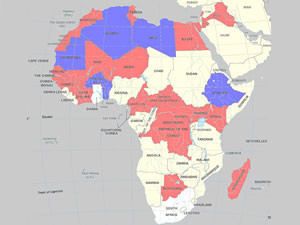
France Telecom, under its Orange telecom brand, is expanding aggressively in Africa. The company has direct presence in 18 countries, primarily the Francophone nations in the north, but is hungrily eyeing the rest of the continent, and SA as much as anywhere else.
Orange is now present in SA in several forms, and speculation is growing that the group may acquire a local provider, or form a mobile virtual network operator (MVNO) to propel it into the market. That is unlikely in the short-term, but a definite possibility further down the line, analysts say.
"They said to us, in 2007 or 2008, that they were going to really punch it up in Africa, and specifically outside the Francophone regions," says Will Hahn, principal research analyst at Gartner. The company's appetite for risk could overcome concerns of possible instability, Hahn adds, such as SA's erratic government involvement in telecom policy. "The big news in the last two years was them taking the fourth mobile licence in Congo. That's a nation that's very high risk, so they have an appetite for risk. The country is unsettled, but the growth is there and the return is potentially there.
"France Telecom, more than most of the big 10, is under significant pressure at home," Hahn says, describing the heavily contested domestic telecom market in France and mainland Europe. "They need to look at emerging markets and other sources of revenue."
France Telecom has a record of measured steps into new markets, building brand awareness through partnerships and ensuring infrastructure is in place before entering new markets. In 2010, it led the formation of a consortium to lay the ACE cable between France and SA, with planned landing sites in 20 countries down the west coast of Africa. Several of those locations serve existing Orange markets, but many are new markets for the French firm. The cable went live in December 2012.
It already has a business presence in SA: Orange Business Services, serving multinational clients. And now the firm is targeting consumers with localised apps and content to build momentum for the Orange brand. It teamed up with Baidu to create a Web browser for African users, and has launched the Orange Horizons initiative, under which it has opened an e-commerce site and local content portal.
The launch of Orange Horizons in SA was itself a strategic shift, bringing SA into the roadmap ahead of schedule, thanks to the Afcon football tournament, which Orange sponsors. "Our launch in SA was actually not planned," said Orange Horizons MD S'ebastien Crozier. "While we were always looking to grow a consumer brand in SA, we weren't going to do so right now. Then, when the Afcon host country changed from Libya to SA (in September 2011), we started to strategise."
To buy or not to buy?
A lingering question is whether France Telecom/Orange will acquire a local telecom operation or establish an MVNO. An MVNO is the likely next step: Crozier confirmed that was on the cards, though it could take several years before regulatory issues and partnership agreements could be resolved.
Further down the line, though, the company could look to establish itself as a full network operator, expanding its presence and services further. Pyramid Research suggests that 8ta, Cell C or even Neotel could be attractive options, with "Cell C being closest to France Telecom's core business and comfort zone".
Hahn agrees, noting that Cell C's strategy of outsourcing its tower infrastructure has turned it into something resembling an MVNO itself. But if Telkom is restructured into a wholesale operation, and the retail components including 8ta divested, then an Orange/8ta acquisition could be on the agenda.
"Telkom has come under fire for the continued losses at 8ta, despite healthy growth," says Arthur Goldstuck, MD of World Wide Worx. "Management is under pressure to address these losses, and addressing need not necessarily mean bringing it to profitability. It could well mean selling or merging the unit."
"But I think it would be crippling if Telkom just sold off 8ta," Hahn adds. "8ta's the one thing that's really happening for them right now. I said last year that I thought Telkom had one last strategic push left in it, one shot and then it's bail-out time."
Cell C is in a turnaround phase under the new leadership of Alan Knott-Craig. If the company improves its financials in the next few years, it could be an option for Orange and current owner Saudi Oger.
But despite aggressive price cuts, Cell C has not managed to grow its market share substantially against the 70% dominance of Vodacom and MTN, and 8ta is also struggling to make major headway. Whether Orange would want to buy into an entrenched minority position in a saturated market is a key question, Hahn says.
Whatever strategy led to Orange taking a foothold in SA, it is unlikely to take a step backwards. SA, like many other African nations, is moving under the growing Orange umbrella.
Share